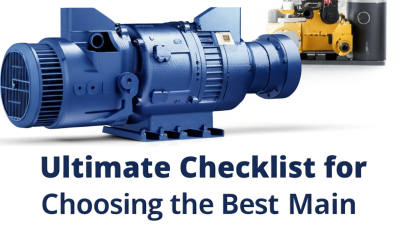Ultimate Checklist for Choosing the Best Main Hydraulic Pump for Your Business Needs
In today's fast-paced industrial environment, the choice of the right Main Hydraulic Pump is critical for optimizing performance and ensuring operational efficiency. As reported by the Global Hydraulic Pumps Market Analysis, the sector is anticipated to grow at a compounded annual growth rate (CAGR) of 5.30% over the next five years, underscoring the increasing demand for high-quality hydraulic solutions.
In China, manufacturers are setting a global benchmark for quality with advancements in technology and production processes, facilitating exports that meet rigorous international standards. Selecting the best Main Hydraulic Pump not only impacts productivity but also plays a pivotal role in sustaining competitive advantage in the global marketplace.
As businesses strive for excellence, this checklist serves as an essential guide to navigate the complexities involved in choosing the ideal hydraulic pump tailored to specific operational needs.
Key Factors to Consider When Choosing a Hydraulic Pump Manufacturer for Optimal Performance
When choosing a hydraulic pump manufacturer, it's essential to evaluate several key factors to ensure optimal performance for your business needs. First and foremost, consider the company's experience and reputation within the industry. A manufacturer with a solid track record is more likely to provide reliable and high-quality products. Look for reviews and testimonials from other clients to gauge their satisfaction with the pumps and services provided.
Another critical factor is the technology and innovation that the manufacturer employs. A leading manufacturer should invest in research and development to produce pumps that meet current industry standards and regulations. This ensures that you receive a product that not only performs efficiently but also stands the test of time in various operational conditions.
Don't overlook the customer support and service offered by the manufacturer. A responsive support team can make a significant difference, especially when you encounter any issues or need maintenance assistance. It's advisable to test their communication channels and response times before committing, ensuring you have a reliable partner for your hydraulic pump needs.
Understanding Hydraulic Pump Specifications: Flow Rate, Pressure, and Efficiency Metrics
When selecting a hydraulic pump for your business, understanding key specifications such as flow rate, pressure, and efficiency metrics is crucial. The flow rate, measured in gallons per minute (GPM) or liters per minute (LPM), indicates how much hydraulic fluid the pump can move in a given timeframe. A higher flow rate is essential for applications requiring quick response times and consistent power delivery. However, it’s equally important to match the flow rate to your system's needs to avoid energy wastage and unnecessary wear on components.
Pressure specifications, typically expressed in pounds per square inch (PSI) or bar, reveal the pump's capability to generate force against resistance. Knowing the maximum pressure your application requires is vital; exceeding this can lead to system failures and costly downtime. Efficiency metrics, often represented as a percentage, highlight how effectively the pump converts mechanical energy into hydraulic energy. A more efficient pump not only reduces operational costs but also minimizes heat generation, extending the lifespan of both the pump and the hydraulic system.
Paying attention to these specifications will ensure you choose the right hydraulic pump that aligns with your operational demands.
Evaluating Manufacturer Reputation: Analyzing Industry Standards and Customer Reviews
When selecting the best main hydraulic pump for your business, evaluating manufacturer reputation is critical. A credible manufacturer will have a proven track record of quality and reliability, which is essential for maintaining operational efficiency. Start by researching industry standards that the manufacturer adheres to; these may include ISO certifications and compliance with relevant safety regulations. Understanding these benchmarks ensures that you are investing in a product that meets both performance expectations and regulatory requirements.
In addition to industry standards, customer reviews provide invaluable insights into the practical performance of the hydraulic pumps you are considering. Prepare to delve into testimonials and case studies shared by previous users, as these experiences can highlight potential strengths and weaknesses of specific models. Pay attention to recurring themes in reviews, such as durability, customer support, and ease of maintenance, as these factors can significantly influence your overall satisfaction with the product. By combining industry certifications with authentic customer feedback, you can make a well-informed choice that aligns with your business needs.
Ultimate Checklist for Choosing the Best Main Hydraulic Pump
Comparative Analysis of Hydraulic Pump Technologies: Gear, Piston, and Vane Pumps
When selecting the best main hydraulic pump for your business, understanding the various technologies available is crucial. Among the primary options are gear, piston, and vane pumps, each offering unique advantages depending on application needs. Gear pumps are known for their simple design and reliability, making them ideal for low-pressure applications. According to a report by Research and Markets, the gear pump market is projected to grow at a CAGR of 4.5%, reflecting their continued relevance in various industries.
Piston pumps, on the other hand, stand out for their efficiency and ability to handle high pressures. They are often favored in heavy-duty applications due to their robust construction and performance capabilities. A study from MarketsandMarkets indicates that the global piston pump market could reach $8 billion by 2026, driven by rising demands in sectors like construction and manufacturing.
Tip: When evaluating pumps, always consider the flow rate and pressure requirements specific to your application. Additionally, vane pumps, while often more complex, can offer smoother operation and less noise, making them suitable for applications requiring precision. Balance these factors against your operational priorities to choose the most suitable hydraulic pump technology for your business.
Assessing Long-term Cost-Effectiveness: Maintenance, Durability, and Warranty Insights
When selecting a main hydraulic pump for your business, assessing long-term cost-effectiveness is crucial. A pivotal aspect to consider is maintenance. Pumps that are designed with easy access for repairs and servicing not only save time but also reduce labor costs over the pump's lifespan. Regular maintenance can prevent significant downtime and ensure that your operations run smoothly.
Durability is another key factor that impacts overall expenses. A hydraulic pump made from high-quality materials can withstand harsh operating conditions and require fewer replacements. Investing in robust pumps may mean a higher initial cost, but the savings from reduced replacement and downtime make it a wise choice.
Lastly, warranty insights play a vital role in long-term cost assessment. Look for manufacturers that offer comprehensive warranties, which indicate confidence in their products. A solid warranty can safeguard your investment, providing peace of mind against unforeseen failures. Ensure that you thoroughly read warranty terms, as they can vary widely and may include conditions that could affect your costs.
Ultimate Checklist for Choosing the Best Main Hydraulic Pump for Your Business Needs - Assessing Long-term Cost-Effectiveness: Maintenance, Durability, and Warranty Insights
| Pump Type |
Maintenance Frequency (Months) |
Durability Rating (Years) |
Warranty Period (Years) |
Estimated Annual Maintenance Cost ($) |
| Gear Pump |
6 |
15 |
3 |
400 |
| Piston Pump |
12 |
20 |
5 |
600 |
| Vane Pump |
8 |
10 |
4 |
500 |
| Hydraulic Screw Pump |
15 |
25 |
7 |
300 |

